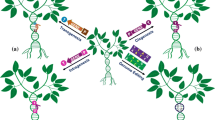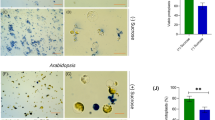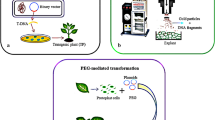Abstract
CRISPR/Cas technology, among the other gene editing systems like TALENs, ZFNs and homing endonucleases, is the preferred choice for genome modification in all types of organisms—from microbes, plants to animals—and has countless applications in various disciplines as diverse as industries, basic research and medicines. In the recent past, this gene editing technology has been used for targeting multiple genes in various crops including Arabidopsis, rice, maize, soybean and tobacco for producing new varieties with improved traits like increased yield, biotic and abiotic stress tolerance, improved food quality. The advantages of this technology over genetic engineering for producing elite plants (nontransgenics) will avoid the stringent regulatory tests and ethical issues related to these plants being accepted by the public.
Similar content being viewed by others
Suggested Reading
Y Oladosu, et al., Principle and application of plant mutagenesis in crop improvement: A review, Biotechnol. Biotechnol. Equip., Vol.30, pp.1–16, 2016.
N Podevin, H V Davies, F Hartung, F Nogue, JM Casacuberta, Site-directed nucleases: A paradigm shift in predictable knowledge based plant breeding, Trends Biotechnol., Vol.31(6), pp.375–383, 2013.
J Smith, et al., A combinatorial approach to create artificial homing endonucleases cleaving chosen sequences, Nuc. Acid. Res., Vol.34, e149, 2006.
H Puchta and F Fauser, Synthetic nucleases for genome engineering in plants: Prospects for a bright future, Plant J., Vol.78 pp.727–741, 2014.
G Hensel and J Kumlehn, Genome engineering using TALENs, Methods Mol. Biol., Vol.1900, pp.195–215, 2019.
Y Mao, et al., Development of germ-line specific Crispr-Cas9 systems to improve the production of heritable gene modifications in Arabidopsis, Plant Biotechnol. J., Vol.14, pp.519–532, 2016.
A Sandhya, P Jogam, V R Allini, S Abbagani, A Alok, The present and potential future methods for delivering CRISPR/Cas9 components in plants, J. Genet. Eng. Biotech., Vol.18, p.25, 2020.
T Čermćk, et al., A Multipurpose toolkit to enable advanced genome engineering in plants, Plant Cell, Vol.29, pp.1196–1217, 2017.
L Cong, et al., Multiplex genome engineering using CRISPR/Cas systems, Science, Vol.339, pp.819–823, 2013.
M Andersson, et al., Genome editing in potato via CRISPR-Cas9 ribonucleoprotein delivery, Physiol. Plant, Vol.164, pp.378–384, 2018.
B Castel, L Tomlinson, F Locci, Y Yang, JD Jones, Optimization of T-DNA Architecture for Cas9 Mediated Mutagenesis in Arabidopsis, Plos One, Vol.14(1), e0204778, 2019.
Kaur, et al., CRISPR/Cas9-mediated efficient editing in phyotene desaturase (PDS) demonstrates precise manipulation in banana cv. Rasthali genome, Func. Integ. Genom., Vol.18(1), pp.89–99, 2018.
Y Zhang, Z Liang, Y Zong, Y Wang, J Liu, et al., Efficient and transgene-free genome editing in wheat through transient expression of CRISPR/Cas9 DNA or RNA, Nat. Comm., Vol.7, pp.12617, 2016.
W Wang, Q Pan, F He, A Akhunov, S Chao, H Trick, et al., Trans-generational CRISPR-Cas9 activity facilitates multiplex gene editing in allopolyploid wheat, CRISPR J., Vol.1, pp.65–74. 2018. doi: https://doi.org/10.1089/crispr.2017.0010
M Li, X Li, Z Zhou, et al., Reassessment of the four yield-related genes Gn1a, DEP1, GS3 and IPA1 in rice using a CRISPR/Cas9 system, Front. Plant Sci., Vol.7, pp.377, 2016.
Y Zhang, Z Liang, Y Zong, et al., Efficient and transgene-free genome editing in wheat through transient expression of CRISPR/Cas9 DNA or RNA, Nat. Comm., Vol.7, pp.12617, 2016.
Z Liang, K Zhang, K Chen, et al., Targeted mutagenesis in Zea mays using TALENs and the CRISPR/Cas System, J. Genet. Genomics., Vol.41, pp.63–68, 2014.
H Zhang, J Zhang, Z Lang, et al., Genome-editing-Principles and applications for functional genomics research and crop improvement, Crit. Rev. Plant Sci., Vol.36(4), pp.291–309, 2017.
Y Yang, G Zhu, R Li, et al., The RNA editing factor SlORRM4 is required for normal fruit ripening in tomato, Plant Physiol., Vol.175, pp.1690–1702, 2017.
Y Sun, G Jiao, Z Liu, X Zhang, J Li, et al., Generation of high-amylose rice through CRISPR/Cas9-mediated targeted mutagenesis of starch branching enzymes, Front. Plant Sci., Vol.8, pp.1298, 2018.
M Andersson, H Turesson, A Nicolia, AS Falt, M Samuelsson, P Hofvander, Efficient targeted multiallelic mutagenesis in tetraploid potato (Solanum tuberosum) by transient CRISPR-Cas9 expression in protoplasts, Plant Cell Rep., Vol.36, pp.117–28, 2017.
A Peng, et al., Engineering canker-resistant plants through CRISPR/Cas9-targeted editing of the susceptibility gene CsLOB1 promoter in citrus, Plant Biotechnol. J., Vol.15, pp.1509–1519, 2017.
V Nekrasov, C Wang, J Win, et al., Rapid generation of a transgene-free powdery mildew resistant tomato by genome deletion, Sci. Rep., Vol.7, pp.482, 2017.
Z Zhang, X Ge, X Luo, et al., Simultaneous editing of two copies of Gh14-3-3d confers enhanced transgene-clean plant defense against Verticillium dahliae in allotetraploid upland cotton, Front. Plant Sci., pp.842, 2018.
X Wang, M Tu, D Wang, et al., CRISPR/Cas9-mediated efficient targeted mutagenesis in grape in the first generation, Plant Biotechnol. J., Vol.16, pp.844–855, 2018.
A Endo, et al., Efficient targeted mutagenesis of rice and tobacco genomes using Cpf1 from Francisella novicida, Sci. Rep., Vol.6, pp.38169, 2016.
J Shi, H Gao, H Wang, HR Lafitte, RL Archibald, et al., ARGOS8 variants generated by CRISPR-Cas9 improve maize grain yield under field drought stress conditions, Plant Biotechnol. J., Vol.15(2), pp.207–216, 2017.
T Lawrenson, et al., Induction of targeted, heritable mutations in barley and Brassica oleracea using RNA-guided Cas9 nuclease, Genome Biol., Vol.16, pp.258, 2015.
M Klimek-Chodacka, T Oleszkiewicz, L Lowder, et al., Efficient CRISPR/Cas9-based genome editing in carrot cells, Plant Cell Rep., Vol.37, pp.575–586, 2018.
M Andersson, et al., Genome editing in potato via CRISPR-Cas9 ribonucleoprotein delivery, Physiol. Plant., Vol.164, pp.378–384, 2018.
A Charrier, et al., Efficient targeted mutagenesis in apple and first time edition of pear using the CRISPR-Cas9 system, Front. Plant Sci., Vol.10, pp.40, 2019.
S Nonaka, C Arai, M Takayama, et al., Efficient increase of γ-aminobutyric acid (GABA) content in tomato fruits by targeted mutagenesis, Sci. Rep., Vol.7, pp.7057, 2017.
R Barrangou and L Marraffini, CRISPR-Cas Systems: Prokaryotes upgrade to adaptive immunity, Mol. Cell., Vol.54, pp.234–244, 2014.
Author information
Authors and Affiliations
Corresponding authors
Additional information
Arvinder Singh is Assistant Professor in Botany, Akal University, Talwandi Sabo, Punjab. He specializes in seed proteomics and his research involves the characterization and improvement of seed protein quality in cereals and legumes.
Muskan Bokolia is research scholar in Department of Botany, Akal University, Talwandi Sabo, Punjab. She is currently working on the characterization of seed proteins in cotton.
Rights and permissions
About this article
Cite this article
Singh, A., Bokolia, M. CRISPR/Cas for Crop Improvement. Reson 26, 227–240 (2021). https://doi.org/10.1007/s12045-021-1121-4
Published:
Issue Date:
DOI: https://doi.org/10.1007/s12045-021-1121-4




